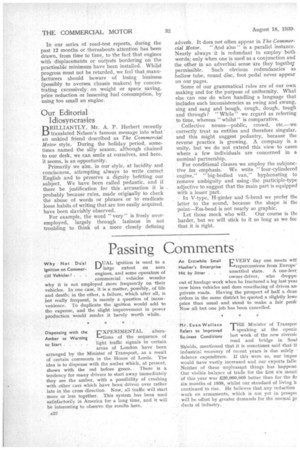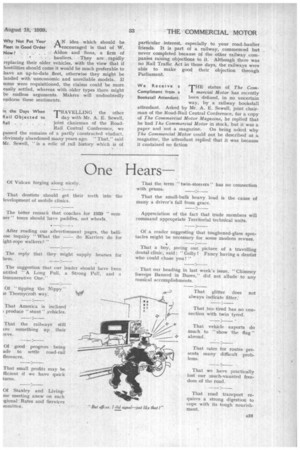Passing Comments
Page 24

Page 25

If you've noticed an error in this article please click here to report it so we can fix it.
DUAL ignition is used to a large extent on aero engines, and some operators of commercial vehicles wonder why it is not employed more frequently on their vehicles. In one case, it is a matter, possibly, of life and death; in the other, a failure, which after all, is not really frequent, is merely a question of inconvenience. To duplicate the ignition would add to the expense, and the slight improvement in power production would render it barely worth while. Why Not Dual Ignition on Commercial Vehicles?
Dispensing with the E`XPERIMENTAL altera
Amber as Warning tions of the sequence of
to Start light traffic signals in certain
areas of London have been arranged by the Minister of Transport, as a result of certain comments in the House of Lords. The idea is to dispense with the amber which, at present, shows with the red before green. There is a tendency for many drivers to start away immediately they see the amber, with a possibility of crashing with other cars which have been driven over rather late in the cross direction. Now, all traffic will start more or less together. This system has been used satisfactorily in America for a long time, and it will be interesting to observe the results here.
.a2•2
An Erstwhile Small r VERY day one meets witl Haulier's Enterprise 1--,repercussions from Europe' Hit by Jitter . . . unsettled state. A one-lorr.
owner-driver, who droppe out of haulage work when he fractured a leg last ye,aa now hires vehicles and does resurfacing of drives an private roads. Having the prospect of half a doze orders in the same district he quoted a slightly lowe price than usual and stood to snake a fair profn Now all but one job has been cancelled.
Mr. Euan Wallace 711-1E Minister of Transpor Refers to Improved I speaking at the openir Business Conditions last week of the new riversic road and bridge in Soul Shields, mentioned that it is sometimes said that ft industrial recovery of recent years is due solely • defence expenditure. If this were so, our impor would have vastly increased and our exports falle: Neither of these unpleasant things has happene, Our visible balance of trade for the first six moat] of this year was 220,000.000 better than for the fit six months of 1938, whilst our standard of living h. continued to rise. He believes that any reduction work on armaments, which is not yet in prosper will be offset by greater demands for the normal pr ducts of industry.
Why Not Put Your A N idea which should be Fleet in Good Order I-1 encouraged is that of W.
Now Aldon and Sons, a firm of
hauliers. They are rapidly replacing their older vehicles, with the view that if hostilities should come it would be much preferable to have an up-to-date fleet, otherwise they might be landed withuneconomic and unreliable models. If some were requisitioned, the claims could be more easily settled, whereas with older types there might be endless arguments. Makers will undoubtedly endorse these sentiments.
In the Days When TRAVELLING the other
Rail Objected to I day with Mr. A. E. Sewell,
Rail joint chairman of the Road Rail Central Conference, we passed the remains of a partly constructed viaduct, obviously abandoned many years ago. "That," said Mr. Sewell, "is a relic of rail history which is of particular interest, especially to your road-haulier friends. It is part of a railway, commenced but never completed because of the other railway companies raising objections to it. Although there was no Rail Traffic Act in those days, the railways were able to make good their objection through Parliament.
We Receive a TIRE status of The Corn Compliment from a A tnercial Motor has recently
Bookstall Attendant. been defined, in no uncertain
way, by a railway bookstall attendant. Asked by Mr, A, E. Sewell, joint chairman of the Road-Rail Central Conference, for a copy of The Commercial Motor Magazine, he replied that he had Ilse Commercial Motor in stock, but it was a paper and not a magazine. On being asked why The Commercial Motor could not be described as a magazine, the attendant replied that A was because it contained no fiction




































































